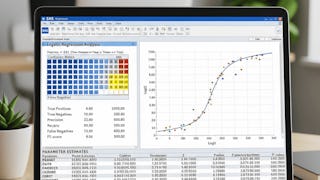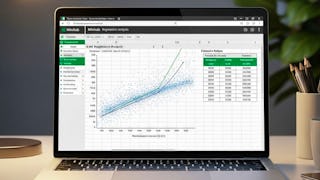This beginner-friendly course provides a comprehensive introduction to logistic regression, one of the most widely used techniques in data science and analytics. Learners will explain regression fundamentals, differentiate probability prediction methods, and analyze logistic regression key concepts including logit transformation, odds interpretation, and Maximum Likelihood Estimation (MLE).



Logistic Regression Fundamentals: Analyze & Predict

Instructor: EDUCBA
Access provided by Wolfgang Confectioners
What you'll learn
Explain logistic regression fundamentals, logit transformation, and odds interpretation.
Apply SAS PROC LOGISTIC for variable selection and predictive modeling.
Evaluate model performance using chi-square tests, concordance, and fit measures.
Skills you'll gain
Details to know

Add to your LinkedIn profile
6 assignments
August 2025
See how employees at top companies are mastering in-demand skills

There are 2 modules in this course
This module introduces learners to the fundamentals of regression and lays the groundwork for understanding logistic regression. Beginning with an overview of regression analysis, the module explores how dependent and independent variables interact, the role of coefficients, and the importance of error terms in modeling. Learners will examine practical applications of regression in real-world problem-solving and policymaking. The module then transitions into different probability prediction methods, highlighting when and why logistic regression is more appropriate than ordinary least squares (OLS). By the end, learners will have a solid conceptual foundation for applying logistic regression to binary outcomes in analytics and decision-making contexts.
What's included
8 videos3 assignments
This module deepens the learner’s understanding of logistic regression by focusing on key modeling concepts, practical approaches, and industry-standard methodologies. Learners will explore foundational ideas such as observation periods, validation samples, and outlier treatment before moving into logistic regression’s core principles, including the logit transformation, odds-to-probability conversion, and the importance of Maximum Likelihood Estimation (MLE). The module introduces practical approaches such as the Binning, Continuous, and Dummy Variable methods to improve model stability. Learners will then engage with SAS-based methodologies for variable selection, PROC LOGISTIC procedures, and evaluation techniques such as concordant/discordant pairs and global vs local measures of model fit. By the end of this module, learners will have the applied knowledge to build, evaluate, and refine logistic regression models in real-world data science and analytics contexts.
What's included
7 videos3 assignments
Why people choose Coursera for their career









